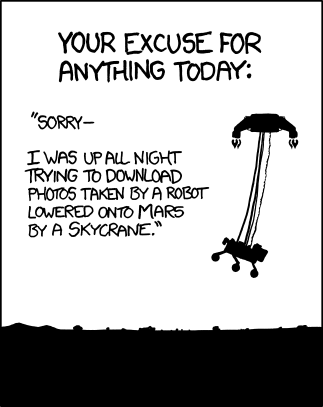redxavier wrote:But each robot can only be programmed to perform specific, pre-determined functions. What if you want it to do something else? Tough luck.
Humans can only carry a limited amount of equipment with them. Less, actually because of all the weight they themselves take up, together with their bulky life support systems. So the same restrictions apply. All the best mass spectrometers and electron microscopes are going to be on Earth, so all Mars astronauts are actually doing is selecting the best samples. In principle a robot can do that too - controlled by humans on Earth examining the candidates. Sure, it's a slower process, but you do visit more interesting, more difficult to get to sites by sending robots. The best sample collections sites might be too difficult to land humans onto.
redxavier wrote:I think Curiosity is a great machine, but a team of humans on Mars will accomplish more in the talked about 1-2 year mission than several dozen MSL robots would do in several decades.
If humans are so great, why aren't we sending humans to Mars? 150lb sacks of water that need oxygen, whose bones disintegrate with protracted zero-g, vulnerable to cosmic radiation, the need to return to Earth, etc. Even if there was a manned program greenlit tomorrow, it'd be 2030 before we actually landed at a cost of many hundreds of billions. Curiosity took 6-odd years and a couple of billion. With mass production, that could be 1-2 years at <$1B.
redxavier wrote:Whilst at the same time, in neglecting manned exploration, you're further crippling growth in that aspect of space travel.
What is it that humans are actually supposed to do in space? Surely more than collect rocks? Colonise? Not in our great-great-great grandchildren's lifetime. Not with the technology we have at the moment.
If your argument is that sending humans will develop new technologies, then so will sending probes to Titan, Venus, Enceladus, Europa, etc. That'll also entail new propulsion systems, etc.
redxavier wrote:And again, look at the experience with our Moon. We learned more and did more science on the moon in those 8 missions (I'm not including Apollo 13 for obvious reasons) than anything done in decades of robotic exploration.
Apollo took up a MASSIVE amount of USA GDP. Had the same resources been put into remote-controlled rovers, you could have got more samples for your buck. Much more.
redxavier wrote:Just ignore for the moment the PR accomplishment of putting Armstrong and Aldrin on the moon and planting a flag, and consider that a further 10 men actually worked on the moon. Heck, humans have done more experiments in earth orbit that any robot could hope to accomplish.
That's not true. Most of our knowledge of the solar system has come from robots. Hubble is a robot. Viking, Voyager, Cassini, Galileo, Magellan, MER, and dozens more are all robots, all returning quality information. How long could a human last in Jupiter's radiation belt? Or on the surface of Venus? Even on the Moon they were restricted in how far they could venture from the lander and how long they could be on the surface. Bulky suits, limited 02, multiple visors, low gravity, and thick gloves restrict humans significantly.
Apollo astronauts were also lucky not to get hit by any CME from the Sun. Once we leave Earth's van Allen belts, we are sitting ducks to all the dangerous shit out there: high energy protons, gamma rays, micrometeorites, etc.
redxavier wrote:Going to Mars isn't going to be about planting a flag, it will be about actually doing a wide range of activities that we just can't do with robots.
Okay, tell us some practical realistic things humans can do on the surface of Mars that robots can't in principle also do? Remember, Apollo astronauts deployed experiments on the surface and collected rocks - they didn't actually perform any experiments themselves. The labs back on Earth are where the real testing actually takes place.
redxavier wrote:Further, robotics aren't anywhere near where they need to be to really replace humans in doing science and exploring.
Agreed. I don't think we'll be getting autonomous robots anytime soon. Better resolution cameras, more instruments, long-life power supply, more communications bandwidth, etc. My arguments are not based on impending AI, but robots as remote-controlled sensor platforms with humans making all the intellectual decisions back in the office at JPL.
not long to go now...














 )
)
